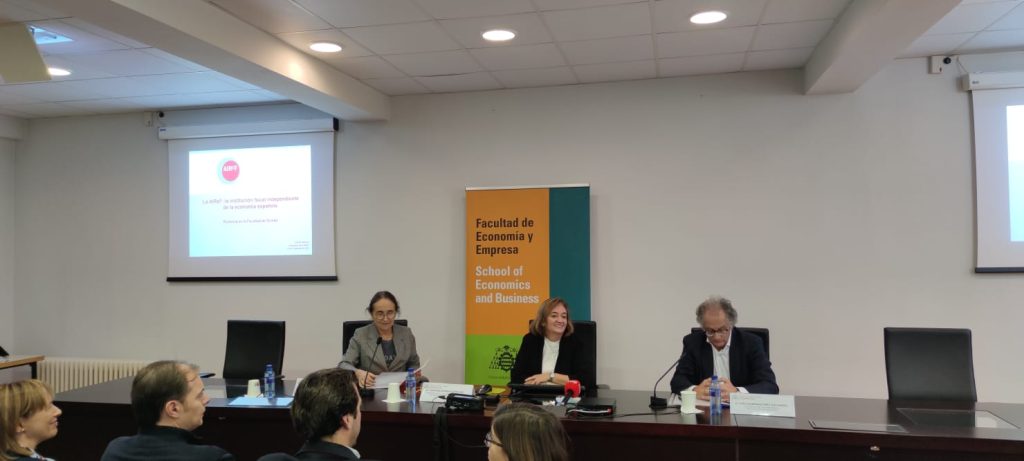
The President of the Independent Authority for Fiscal Responsibility (AIReF), Cristina Herrero, gave a presentation today at the Faculty of Economics in Oviedo on the role played by AIReF in the Spanish economy. The institution has established itself as a benchmark in the field of fiscal and public policy evaluation, thanks to its rigorous analyses conducted with the highest parameters of transparency.
The President of AIReF reviewed the origins of the institution, created in 2013 within the framework of the second reform of the Stability Pact, seeking to promote national appropriation of fiscal discipline through the establishment of national fiscal rules, the preparation of medium-term fiscal frameworks, increased transparency and the creation of second-generation Independent Fiscal Institutions (IFIs) focused on fiscal oversight.
AIReF was established in 2013, pursuant to this European impetus, as a unique institution, with distinct characteristics in relation to other IFIs. For example, AIReF has a broad and granular mandate covering all tiers of government, and it has a unique funding mechanism through a fee paid by all supervised tiers of government. The institution operates with significant legal powers by means of the “comply or explain” principle that governs the recommendations it issues, and its independence has safeguards, such as a six-year term limit for the presidency and the requirement for the appointment to obtain an absolute majority in the Congress of Deputies.
At a national level, AIReF was also created as a unique institution, as it is neither a regulatory nor an audit authority and has no management or disciplinary powers. AIReF was established with functions limited to economic and budgetary analysis and a very specific supervisory role not previously performed by any other institution.
Supervision and evaluation, AIReF’s functions
In the exercise of its mandate, AIReF supervises all tiers of government throughout the budgetary cycle: planning, monitoring of budgetary execution and the application of fiscal discipline when necessary. It possesses a significant volume of information and conducts a more granular and differential analysis than other authorities, providing exhaustive monitoring of the economic and budgetary situation. This supervisory role is carried out in any context of fiscal rules and has been maintained during the years the rules have been suspended. In parallel, AIReF has been consolidating its role as an evaluator of public policies, which has become a permanent function of the institution after the reform of its statute in 2021. Nowadays, AIReF exercises its mandate through these two functions of supervision and evaluation.
In the course of its supervisory work, AIReF published its latest report on October 26th, in which it outlined the main lines of the budgets of the General Government and the Budgetary Plan for 2024. In that report, AIReF updated its forecasts for 2024, with GDP growth of 1.7% and a public deficit of 3% of GDP. The institution also revised its medium-term forecasts, estimating real GDP growth of 1.4% in 2028, a deficit that would stabilise at 3.2% of GDP and public debt of around 105% of GDP. The analysis also includes the outlook of the Autonomous Regions and Local Governments for 2023 and 2024.
In terms of evaluation, AIReF has now completed the three phases of the Spending Review 2018-2021, where it evaluated €108.55bn in public spending. It is currently immersed in the first phase of the Spending Review 2022-2026, ongoing commissions such as the annual evaluation of the Minimum Income Scheme (Spanish acronym: IMV), and evaluations commissioned by the Autonomous Regions. Specifically, 11 regions have already requested studies from AIReF. Asturias has commissioned an evaluation on health and social policies. The evaluation function of AIReF is key because, until 2017, there was no true evaluation of the efficiency and efficacy of public policies in Spain.
AIReF, a benchmark
According to the President, Independent Fiscal Institutions (IFIs) like AIReF have become key players in the fiscal debate, providing independent and objective analyses that reduce the information asymmetry between public managers and citizens and contribute to improving the democratic quality of countries. AIReF, as the President stated, is a clear example of this evolution, having established itself as a benchmark in the fiscal and evaluation sphere in just ten years. However, the independence and singular nature of these institutions cannot be taken for granted as they arouse discomfort and are therefore vulnerable, so it is necessary to protect their autonomy to the maximum.
In this context, the President considered that the future reform of the fiscal framework currently being debated in the European Union should be harnessed to strengthen IFIs by maximising their potential in line with the experience of countries with a long tradition of these institutions. However, Ecofin negotiations could relegate these institutions to mere compliance supervisors, which would be a step backward and a missed opportunity. According to Cristina Herrero, AIReF could play a key role as a nexus between the European and national fiscal frameworks. With its experience and capacity, it could provide essential and objective analyses in the future framework.
In conclusion, the President pointed out that, with or without European reform, Spain could make progress on the reform of the national fiscal framework, with a view to strengthening the medium-term vision, the system of setting targets to make them realistic and credible, improve coordination mechanisms and the budgetary procedure, review the expenditure rule and reform the regional financing system, among other matters.






